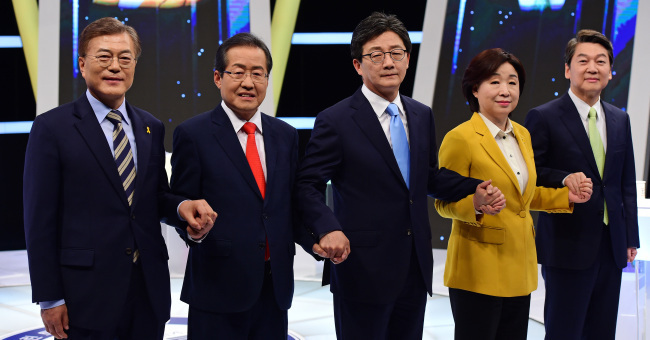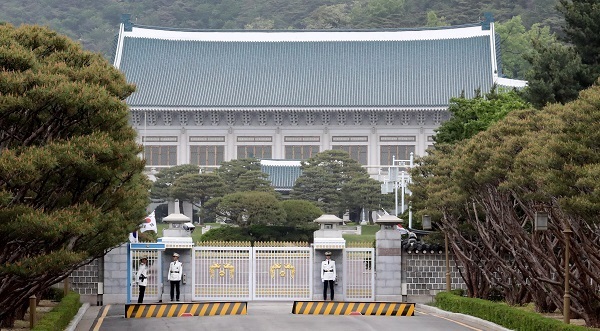From the controversial deployment of a US-led missile defense system to political reforms, the next administration is laden with many urgent tasks.
However, the winner of Tuesday’s presidential election, which was still not clear as of press time, is likely to face an uphill battle in dealing with many of the issues, as potential foes outnumber friends in the political arena.
This is why major candidates have all pledged unity and bipartisanship in state management, despite the seemingly vast gulf between them and rival camps.

(Yonhap)
“To form a government of unity and harmony, I will work together with anyone -- from rational progressives to reform-minded conservatives -- regardless of their party affiliation,” said Moon Jae-in of the liberal Democratic Party of Korea, who the final batch of polls, released a week before Election Day, pinpointed as the favorite to win the election.
Revision of the Constitution, last amended in 1987, up to the changing times has emerged as a major post-election task for the incoming president as well as the National Assembly. A parliamentary special committee is to begin work in June, setting out to review flaws of the current five-year, single-term presidential system, as evidenced partly in the impeachment of President Park Geun-hye, and to try to come up with an alternative that can be put forward in a constitutional revision.
While this could lead to a heated political debate, not a single political party in South Korea right now can push for its idea unchallenged.
Even Moon’s Democratic Party, which has the largest presence in the National Assembly chamber, lacks a majority, holding 119 of the 300 seats. The numbers are insufficient to enable him to push through his plans without cooperation from other parties.
The two conservative parties -- Liberty Korea Party and Bareun Party - together control 126 seats, while the centrist People’s Party holds 40 and the hard-left Justice Party has six seats.
While building coalitions across the aisle on key issues, the new administration must also strive to heal the deep rift among the public over former President Park, who is now standing a criminal trial over corruption charges.

Police officers stand guard at the main gate of the presidential office Cheong Wa Dae in Seoul on May 9, 2017, the day to pick the new occupant of the office to succeed ousted President Park Geun-hye. (Yonhap)
The new president will take office in an extremely challenging diplomatic and security environment.
Having tested a fifth atomic bomb last year, North Korea claims to be on the verge of mastering the technology for an intercontinental ballistic missile capable of striking the US mainland. Tension on the Korean Peninsula has soared to a fresh high in recent months as Washington staged a series of show of force and warned of military action. China, a top partner of trade, tourism and investment and a core stakeholder in multilateral talks aimed at denuclearizing the North, has been taking crippling economic retaliation over Seoul’s decision to house the US’ Terminal High Altitude Area Defense system. Following a brief respite, relations with Tokyo have been frayed yet again by a girl statue that represents Korean women who were forced into sex slavery during World War II.
These factors will come together to examine the new South Korean leader’s credentials as the negotiator-in-chief. And yet, there is another twist to the test: He is encircled by a league of national leaders who assert their respective agenda like no other -- take Kim Jong-un of North Korea, Donald Trump of the US, Xi Jinping of China, and Shinzo Abe of Japan.
Given the alliance with the US being the mainstay of security, the new president’s first and foremost task is likely to build a rapport with Trump, making up for the missing initial chances due to the impeachment of former President Park Geun-hye that caused a monthslong leadership vacuum.
Concerns have been growing that Seoul may be passed over as Trump and Xi have been discussing the fate of the peninsula since their summit last month. Then the erratic US leader fanned the flames by demanding Seoul pay $1 billion for the THAAD battery even though terms had already been agreed on.
The president-elect is also tasked with balancing between territorial and historical disputes and an increasingly crucial security partnership with Japan, as well as renegotiating the December 2015 settlement on the sex slavery issue which drew backlash from the victims and the public. More recently the two countries were engaged in another string of spats over a new girl statue set up in front of the Japanese consulate-general in Busan, as well as Tokyo’s renewed claims to the Korean islets of Dokdo.
On an economic and business front, the president faces the difficult task of preparing the Korean economy for the next era of growth amid low birthrates and a rapidlyaging population. The new state leader will also have to take a new approach to chaebol, the large family-owned conglomerates which have been sustaining the local economy for decades through comfortable ties with politics.
As Samsung Electronics Vice Chairman Lee Jae-yong stands trial for bribery in relation to the Park Geun-hye scandal, the key point for the new president will be whether they will push conglomerates to establish a transparent management structure and tackle complex cross-shareholdings.
“The environment is building up for a new president to actually push for chaebol reform. If an opposition party takes power and fails to do so, it is very likely that Korea will face an economic crisis,” said Park Sang-in, a professor at Seoul National University, in his book, “Chaebol Reform, Why Now,” published in March.
For the past five years, the economy has suffered low growth with annual gross domestic product expansions failing to reach 3 percent since 2012, except for 3.3 percent growth in 2014. The low birthrate and fast aging population are likely to hurt domestic demand and raise welfare costs, pulling down the overall economic growth.
By Choi He-suk (
cheesuk@heraldcorp.com), Kim Yoon-mi
(yoonmi@heraldcorp.com) and Shin Hyon-hee (
heeshin@heraldcorp.com)






![[Weekender] How DDP emerged as an icon of Seoul](http://res.heraldm.com/phpwas/restmb_idxmake.php?idx=645&simg=/content/image/2024/04/25/20240425050915_0.jpg&u=)
